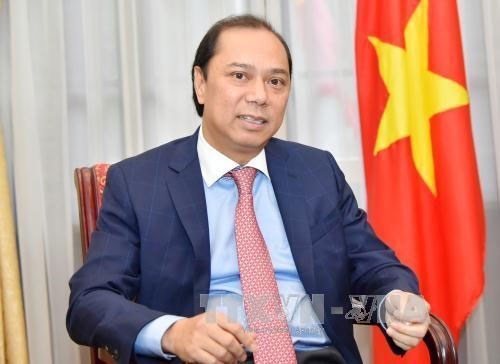Reporter: “Shared Values, Common Destiny” is the theme of the ASEAN-India Commemorative Summit. Could you please tell us the meaning of this theme and what are the benefits that the summit’s outcomes brought to the ASEAN-India ties?
Deputy-FM Dung: The theme of “Shared Values, Common Destiny” is meaningful, showing respect to the history and hope for the future of the ASEAN-India ties. For thousands of years, India and Southeast Asian nations had exchanges on trade, culture, religion, and philosophical thoughts. These are shared values that both sides hope to further. Also, the two sides wished to cooperate for peace, stability and prosperous development on the basis of legal observation in the regions of the Indian Ocean and Pacific Ocean.
According to this spirit, leaders of both sides widely exchanged ideas about their ties during the Summit. The most important outcome of the Summit is the adoption of the Delhi Declaration that outlines the vision, orientations and measures to lift ASEAN-India strategic partnership to a new height. The Delhi Declaration announced that ASEAN and India will further enhance their comprehensive cooperation across politics-security, socio-economy-culture, connectivity and narrowing of development gaps. Also, these are cooperative pillars of the ASEAN Vision 2025. I do believe that the ASEAN-India ties will also practically contribute to the development of ASEAN community.
    |
 |
|
Deputy-Foreign Minister (Deputy-FM) Nguyen Quoc Dung. Source: VNA |
Reporter: Vietnam undertook the role of coordinator for ASEAN-India ties in August 2015. Could you please tell us the remarkable role of Vietnam in promoting the ASEAN-India ties?
Deputy-FM Dung: Since Vietnam undertook the role of coordinator in August 2015, the ASEAN-India ties have thrived. The country’s major task was to accelerate the implementation of the set plan and cooperative program between the ASEAN and India, organize meetings at levels of foreign ministers and senior officials, and other relevant activities as well as support cooperative projects of both sides.
Several outcomes could be named as follows.
Firstly, the bilateral political ties have unceasingly been strengthened through dialogue and cooperative mechanisms at all levels.
Second, the implementation of the ASEAN-India action plan for 2016-2020 made good progress, with 67 out of 130 lines of action carried out. At Vietnam’s proposal, the two sides worked out of a list of 26 priorities for 2016-2018, helping define focus for the action plan, hence greater effectiveness.
Third, the ASEAN-India cooperation has also expanded into new fields, especially the sea-based economy. In November 2017, Vietnam and India successfully co-organized an ASEAN-India Workshop themed “Blue Economy: From Concept to Action” with numerous proposals to further cooperation in the field.
Fourth, the ASEAN-India cooperation saw a great expansion in both quality and quantity of the cooperative projects. Since 2015, as many as 29 projects were put into operation, notably the ones which were practical to ASEAN nations such as English and information technology training projects, supporting programs for business development, and so on.
Additionally, Vietnam has helped accelerate the completion of a Memorandum of Understanding on the establishment of the ASEAN-India Centre in New Delhi, thereby laying a legal foundation for the center’s operations and raising public awareness of ASEAN and promoting bilateral exchanges.
Reporter: What are Vietnam’s specific contributions to the success of the ASEAN-India Commemorative Summit, sir?
Deputy-FM Dung: The Vietnam delegation proposed a list of commemorative events and co-chaired the drafting of the Delhi Declaration as the role of coordinator for ASEAN-India ties.
Speaking at the Summit, Prime Minister Nguyen Xuan Phuc said ASEAN and India need to see trade and investment as a key driving force of their strategic partnership, accelerate negotiations for the early signing of the Regional Comprehensive Economic Partnership, and increase connectivity to ensure inter-regional sustainability.
He called for efforts to build trustworthy collaboration in the spirit of compliance with international law, equality, mutual respect for the sake of peace and stability; promote trade liberalization, and expand comprehensive cooperation and prosperity in the Indian Ocean and the Pacific.
The achievements during Vietnam’s tenure as coordinator will create momentum for bilateral ties in the coming years.
Reporter: Thank you!
Translated by Trung Thanh